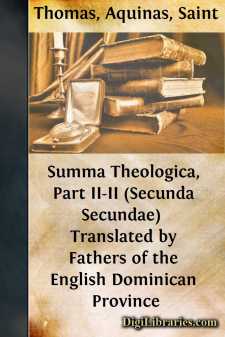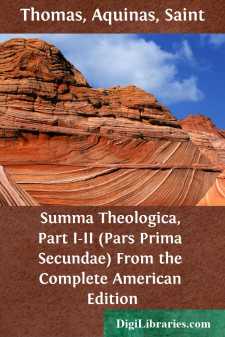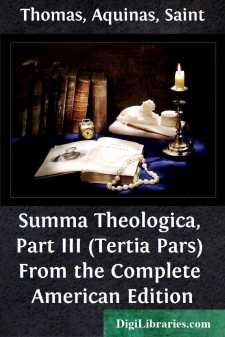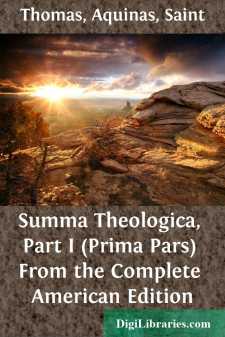Categories
- Antiques & Collectibles 13
- Architecture 36
- Art 48
- Bibles 22
- Biography & Autobiography 813
- Body, Mind & Spirit 142
- Business & Economics 28
- Children's Books 17
- Children's Fiction 14
- Computers 4
- Cooking 94
- Crafts & Hobbies 4
- Drama 346
- Education 46
- Family & Relationships 57
- Fiction 11829
- Games 19
- Gardening 17
- Health & Fitness 34
- History 1377
- House & Home 1
- Humor 147
- Juvenile Fiction 1873
- Juvenile Nonfiction 202
- Language Arts & Disciplines 88
- Law 16
- Literary Collections 686
- Literary Criticism 179
- Mathematics 13
- Medical 41
- Music 40
- Nature 179
- Non-Classifiable 1768
- Performing Arts 7
- Periodicals 1453
- Philosophy 64
- Photography 2
- Poetry 896
- Political Science 203
- Psychology 42
- Reference 154
- Religion 513
- Science 126
- Self-Help 84
- Social Science 81
- Sports & Recreation 34
- Study Aids 3
- Technology & Engineering 59
- Transportation 23
- Travel 463
- True Crime 29
Summa Theologica, Part II-II (Secunda Secundae) Translated by Fathers of the English Dominican Province
by: Aquinas Thomas
Categories:
Description:
Excerpt
TREATISE ON THE THEOLOGICAL VIRTUES (QQ. 1-46) _______________________
QUESTION 1
OF FAITH (In Ten Articles)
Having to treat now of the theological virtues, we shall begin with
Faith, secondly we shall speak of Hope, and thirdly, of Charity.
The treatise on Faith will be fourfold: (1) Of faith itself; (2) Of the corresponding gifts, knowledge and understanding; (3) Of the opposite vices; (4) Of the precepts pertaining to this virtue.
About faith itself we shall consider: (1) its object; (2) its act; (3) the habit of faith.
Under the first head there are ten points of inquiry:
(1) Whether the object of faith is the First Truth?
(2) Whether the object of faith is something complex or incomplex, i.e. whether it is a thing or a proposition?
(3) Whether anything false can come under faith?
(4) Whether the object of faith can be anything seen?
(5) Whether it can be anything known?
(6) Whether the things to be believed should be divided into a certain number of articles?
(7) Whether the same articles are of faith for all times?
(8) Of the number of articles;
(9) Of the manner of embodying the articles in a symbol;
(10) Who has the right to propose a symbol of faith? _______________________
FIRST ARTICLE [II-II, Q. 1, Art. 1]
Whether the Object of Faith Is the First Truth?
Objection 1: It would seem that the object of faith is not the First Truth. For it seems that the object of faith is that which is proposed to us to be believed. Now not only things pertaining to the Godhead, i.e. the First Truth, are proposed to us to be believed, but also things concerning Christ's human nature, and the sacraments of the Church, and the condition of creatures. Therefore the object of faith is not only the First Truth.
Obj. 2: Further, faith and unbelief have the same object since they are opposed to one another. Now unbelief can be about all things contained in Holy Writ, for whichever one of them a man denies, he is considered an unbeliever. Therefore faith also is about all things contained in Holy Writ. But there are many things therein, concerning man and other creatures. Therefore the object of faith is not only the First Truth, but also created truth.
Obj. 3: Further, faith is condivided with charity, as stated above (I-II, Q. 62, A. 3). Now by charity we love not only God, who is the sovereign Good, but also our neighbor. Therefore the object of Faith is not only the First Truth.
On the contrary, Dionysius says (Div. Nom. vii) that "faith is about the simple and everlasting truth." Now this is the First Truth. Therefore the object of faith is the First Truth.
I answer that, The object of every cognitive habit includes two things: first, that which is known materially, and is the material object, so to speak, and, secondly, that whereby it is known, which is the formal aspect of the object. Thus in the science of geometry, the conclusions are what is known materially, while the formal aspect of the science is the mean of demonstration, through which the conclusions are known.
Accordingly if we consider, in faith, the formal aspect of the object, it is nothing else than the First Truth....





